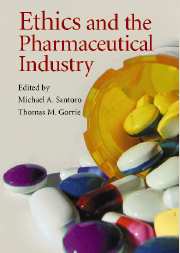Book contents
- Frontmatter
- Contents
- Tables
- Figures
- About the Editors
- Contributors
- Preface
- Acknowledgments
- Foreword
- Introduction: Charting a Sustainable Path for the Twenty-First Century Pharmaceutical Industry
- PART I PROFITS, PATIENTS' RIGHTS, AND SCIENTIFIC PROGRESS: THE ETHICS OF CLINICAL RESEARCH CONDUCTED IN PRIVATE ENTERPRISES
- PART II MARKETING AND THE EFFICIENT UTILIZATION OF HEALTHCARE RESOURCES: ETHICAL AND PUBLIC POLICY CHALLENGES
- PART III PATENTS, PRICING, AND EQUAL ACCESS
- PART IV CONCLUDING THOUGHTS: CHARTING A SUSTAINABLE PATH FOR THE TWENTY-FIRST CENTURY
- Introduction to Part IV
- 21 Evolving Approaches to Healthcare Challenges
- 22 Property Rights in Crisis: Managers and Rescue
- 23 Blurring the Lines: Public and Private Partnerships Addressing Global Health
- 24 Renegotiating the Grand Bargain: Balancing Prices, Profits, People, and Principles
- Notes
- Index
22 - Property Rights in Crisis: Managers and Rescue
Published online by Cambridge University Press: 04 December 2009
- Frontmatter
- Contents
- Tables
- Figures
- About the Editors
- Contributors
- Preface
- Acknowledgments
- Foreword
- Introduction: Charting a Sustainable Path for the Twenty-First Century Pharmaceutical Industry
- PART I PROFITS, PATIENTS' RIGHTS, AND SCIENTIFIC PROGRESS: THE ETHICS OF CLINICAL RESEARCH CONDUCTED IN PRIVATE ENTERPRISES
- PART II MARKETING AND THE EFFICIENT UTILIZATION OF HEALTHCARE RESOURCES: ETHICAL AND PUBLIC POLICY CHALLENGES
- PART III PATENTS, PRICING, AND EQUAL ACCESS
- PART IV CONCLUDING THOUGHTS: CHARTING A SUSTAINABLE PATH FOR THE TWENTY-FIRST CENTURY
- Introduction to Part IV
- 21 Evolving Approaches to Healthcare Challenges
- 22 Property Rights in Crisis: Managers and Rescue
- 23 Blurring the Lines: Public and Private Partnerships Addressing Global Health
- 24 Renegotiating the Grand Bargain: Balancing Prices, Profits, People, and Principles
- Notes
- Index
Summary
The chapters in this book present a challenge under the current property rights regime. On one hand, the case has been made that the dire plight of persons suffering from HIV/AIDS in developing countries requires relaxing the protection of patent rights held by pharmaceutical companies for essential HIV/AIDS medicines. On the other hand, relaxing protection of those patent rights appears to call into question the philosophical foundations of the current intellectual property rights regime and the for-profit nature of the pharmaceutical industry.
This chapter takes up this challenge. Specifically, the chapter aims to ground the pharmaceutical industry's response to the HIV/AIDS crisis in a way that takes the current property rights regime as a given. Central to this account is an examination of the nature of property rights in the context of a crisis.
PROPERTY RIGHTS AND THE HIV/AIDS CRISIS
In Chapter 19, James Thuo Gathii criticizes the argument that the problem of access to HIV/AIDS medicines in developing countries is best addressed by alleviating the widespread poverty in those countries. As part of his account, Gathii chronicles steps taken by Western governments to enforce the protection of patent rights on medicines to treat those afflicted by HIV/AIDS. He describes, for example, the U.S. response to the passage in 1997 of an amendment to South Africa's Medicines and Related Substances Act to improve access to essential HIV/AIDS medicines for South African citizens by authorizing compulsory licensing and parallel importing.
- Type
- Chapter
- Information
- Ethics and the Pharmaceutical Industry , pp. 379 - 385Publisher: Cambridge University PressPrint publication year: 2005
- 1
- Cited by

